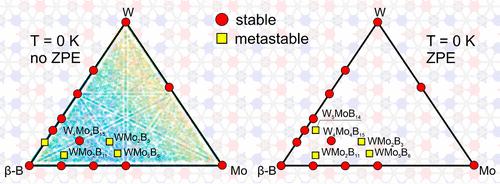
Credit: A. Kvashnin et al./Chemistry of Materials
Scientists from the Skolkovo Institute of Science and Technology (Skoltech), Institute of Solid State Chemistry and Mechanochemistry (ISSC SB RAS), Pirogov Medical University and Yerevan State University have predicted new hard and superhard ternary compounds in the tungsten-molybdenum-boron system using computational methods. Their research was published in the journal Chemistry of Materials.
According to Alexander Kvashnin, a senior research scientist at Skoltech and a co-author of the paper, the study is a natural follow-on to lengthy research into binary systems. In pursuit of new materials, the scientists had to create a more complex system by adding a third element, which resulted in strongly altered properties and new compounds. These changes were the focus of interest for the scientists.
The team predicted the structure of potentially superhard ternary compounds in the W-Mo-B system using the USPEX evolutionary algorithm developed by Artem Oganov, a Skoltech professor and a co-author of the paper, and his students.
“We planned to predict a series of ternary compounds that would display better mechanical properties, such as hardness and fracture resistance, as compared to binary compounds. We did predict several ternary compounds which turned out to be high-entropy alloys. The mixing of tungsten and molybdenum atoms produced compounds that were disordered and, therefore, had varying stability depending on temperature,” explains Alexander Kvashnin.
Carbides ? four- or five-component compounds – are typically classified as high-entropy compounds. Scientists believe that their study is the first step towards finding such compounds among boride systems.
“Obvious prospects of this research may translate into new hard materials outperforming their existing counterparts and withstanding higher temperatures or pressures. Companies such as Gazpromneft may use those materials for drilling or other purposes,” adds Christian Tantardini, one of the authors of the paper and an employee of ISSC and Skoltech.
The scientists intend to pursue their research effort. They are eager to find out what happens to even more complex compounds in response to temperature and pressure changes.
###
Media Contact
Ilyana Zolotareva
[email protected]
Original Source
https:/
Related Journal Article
http://dx.




